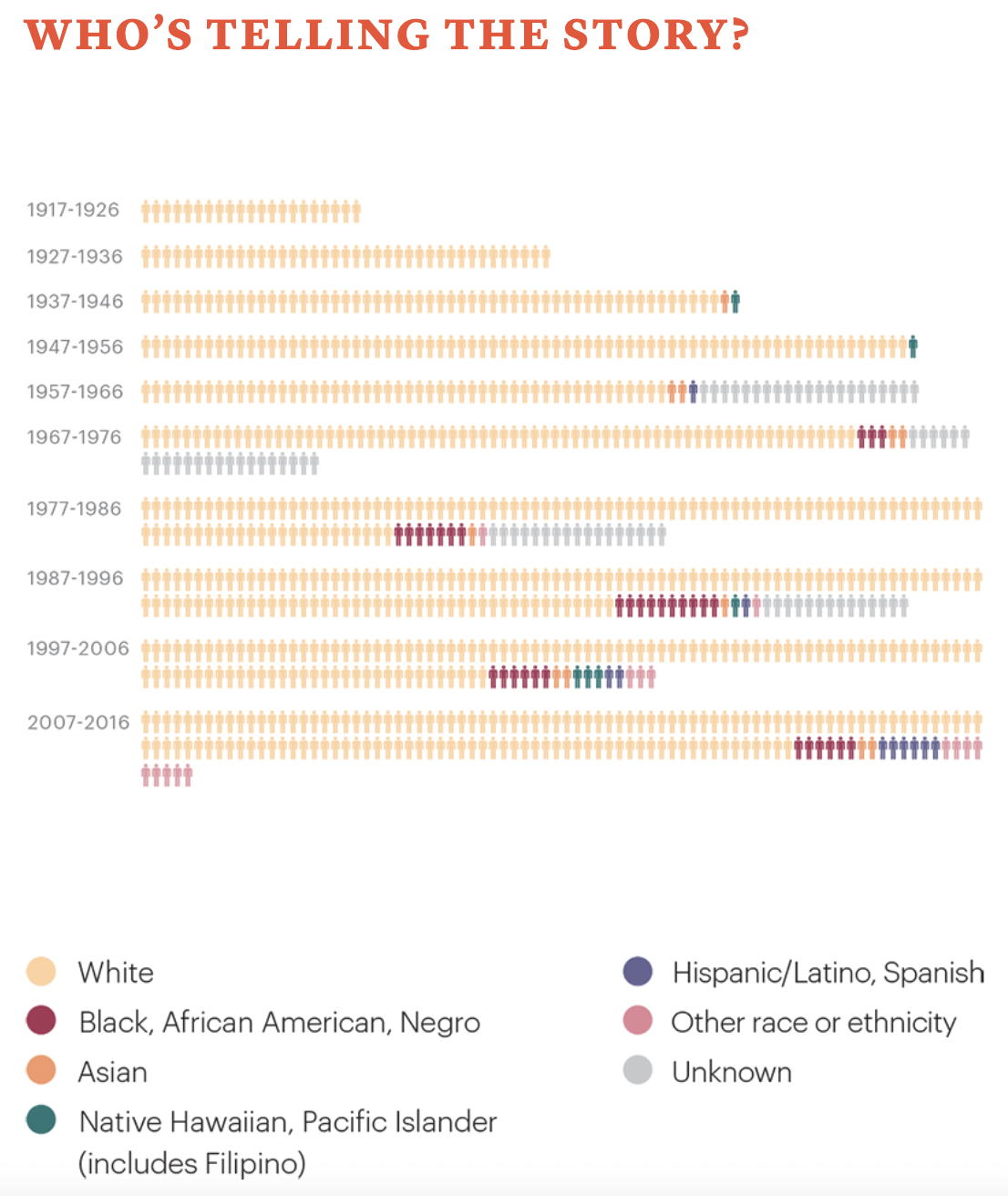Kendrick Lamar Duckworth was born on June 17th, 1987, in Compton, California. Throughout his career he has amassed 13 Grammy Awards, two American Music Awards, five Billboard Music Awards, a Brit Award, 11 MTV Video Music Awards, a Pulitzer Prize, and an Academy Award nomination. I will be focusing on his most recent achievement; winning 2018’s Pulitzer prize for music, for his project DAMN. (released in 2017). The Pulitzer Prize for Music is one of seven Pulitzer Prizes awarded annually in Letters, Drama, and Music. It was first given in 1943. The prize’s terms read: “For a distinguished musical composition by an American that has had its first performance or recording in the United States during the year.”1Topping, Seymour. “History of The Pulitzer Prizes.” Edited by Sig Gissler, The Pulitzer Prizes, www.pulitzer.org/page/history-pulitzer-prizes.
When scrolling through the list of the Pulitzer prize for music recipients, the lack of diversity in prizewinners is clear. There are outliers of course, Du Yun in 2017 , Zhou Long in 2011, and Ornette Coleman in 2007, are a few examples of non-white winners in recent years. But the farther down the list one goes, the diversity in recipients shrinks and shrinks. The racial bias of the Pulitzer prize was revealed in a Columbia Journalism Review study published in the spring of 2016. They found that 84% of Pulitzer prize winners for the last 100 years have been white.2Cjr, The Editors. “100 Years of Data.” Columbia Journalism Review, 2016, Spring, www.cjr.org/analysis/100_years_of_data.php. To get more specific, out of the approximately 2,000 Pulitzer Prizes that have been awarded there have only been 30 African-American winners. In addition to the racial bias, they also found that only 16% of prize winners from the last century have been women. Thankfully there is a growing trend for womens’ representation; within the last decade women have won nearly a third of journalism prizes.3“100 Years of Data.” Columbia Journalism Review, 2016.

Since this data was taken from 2016, the Columbia Journalism Review could not have factored in the rise in minority groups’ representation that has occurred over the past few years. This rise has a direct cause; in August 2017, Dana Canedy was made the administrator of the Pulitzer Prize. Canedy is the first person of color, first woman, and youngest person to ever hold the position. Before taking the job she was a former New York Times editor. Canedy has spent the past three years working to diversify and improve this prestigious organization. In an interview with Vogue in 2020, Canedy had this to say about the recent increase in the diversity of prize winners: “I think what impacted what you saw this year was having a diverse board, having a woman of color as the administrator, and having a diverse jury pool.”4Cuby, Michael. “The Pulitzer Prize Is Getting More Diverse. Dana Canedy Is One Reason Why.” Vogue, Vogue, 9 May 2020, www.vogue.com/article/dana-canedy-pulitzer-prize-administrator-interview. Changes at the very head of the organization, as well as diversifying the rest of the staff, have ideally resulted in a larger representation of previously underrepresented people. Additionally, Canedy stated to Vogue that, “Only when it becomes ‘Of course there was a diverse slate of winners’ will I consider it a success. If folks still consider [the diversity of this year’s winners] to be extraordinary, it simply means that we have more work to do.”5“The Pulitzer Prize Is Getting More Diverse. Dana Canedy Is One Reason Why.” Vogue. Clearly, whoever picked Canedy to head the organization has done what was needed in order to truly strive for equality in these awards. Notably, it was after her arrival that Kendrick Lamar’s DAMN. won the 2018 Pulitzer for Music.
Before Canedy’s arrival it would have been hard to envision Kendrick Lamar winning a Pulitzer prize, but not only because he is black. Lamar’s was the first Pulitzer awarded to an artist who was not a classical or jazz musician. Since 1943, every Pulitzer prize for music before Lamar’s was given to a musician in either one of those fields. It almost seemed like a requirement in order to get the prize, before Lamar broke the mold.
The exclusivity in race, gender, and genre, may remind you of the concept of a musical “genius”, and the way the title of genius seems limited to a privileged few. Someone that is likely to be labeled a genius, would also be likely to win the Pulitzer prize. White males have been historically far more likely to win a Pulitzer than any other group, and have also been historically far more likely to be recognized for their achievements. Racism, sexism, and ableism, are a few of the different agendas that consistently appear when considering who wins prizes and who is lauded for their ability. I’m reminded of Blind Tom, the pianist who used extended techniques (tone clusters, for example) that were only considered ‘experimental’ and ‘boundary breaking’ until Henry Cowell, a white man, used those techniques years later.
In Haefeli’s article, The Problem with Geniuses, she writes, “The stereotype of the solitary genius disempowers women and minorities who do not see people of their gender or ethnicity included in the canon of great composers.”6Haefeli, Sara. “The Problem with Geniuses.” The Avid Listener, 24 July 2020, theavidlistenerblog.com/2020/07/24/the-problem-with-geniuses/. While Lamar is a man, he is also a minority and not a composer or classical/jazz musician, making his odds to win the Pulitzer prize for music that much lower than the many others vying for the award. In many ways, the Pulitzer prize acts as a proxy for the title of genius. This idea of genius can be exclusionary and can create boundaries to the success of non-privileged people. Though Lamar was assisted by the installation of Dana Canedy as the administrator of the Pulitzer prize, his lyricism, production, and hard work on DAMN. is the true reason for his boundary breaking success.
He combines many different techniques throughout the album. In “BLOOD.” Lamar uses spoken word to describe a situation where he is shot by a blind lady he is trying to help. Lamar purposely opens the album with his own death, thereby inserting a non-linear narrative into the project. The instrumental is pushed softly into the background in order to bring the focus on Lamar’s voice. The strings that are present in the beginning fade away, and come back in at around the halfway mark to further compliment the pulsing woodwinds in the background. This provides a more melodic and solemn quality. The strings slowly increase in octave, getting higher and higher, until Lamar is suddenly shot. The increasing, almost distressed, nature of the strings combined with Lamar’s monotone delivery creates a noticeably odd paradox that is collapsed quickly with the loud gunshot. This is a perfect example of Lamar’s ability to create tension and build up towards a climax using the combination of his voice and instruments.
Lamar is known for changing his voice; in parts of “LUST.” he makes his voice higher and more nasally and it takes a more melodic quality. Additionally, in “LUST.”, almost all of the drums are reversed, creating a sound that almost sounds like the drums are ‘whooshing’ past the listener.
While in parts of, “XXX.” Lamar’s voice is very deep and somewhat haunting. Lamar makes these choices purposefully. In the beginning of “XXX.” his deep delivery is paired with a quick drum pattern and record scratches, which almost serve as a different form of percussion. Dissonant piano keys begin to come in, adding to the haunting quality brought by Lamar’s deep delivery. A little before halfway through the track, Lamar’s voice reverts back to normal, and the record scratches are removed. Instead, a repetitive siren plays regularly over the quick drum pattern. The sirens are broken up at points by Lamar breathing heavily into the microphone, symbolizing himself running away from the sirens.
The way that Lamar mixes his vocal delivery, combined with the odd production (reversed drums, record scratches, etc.) emphasizes the experimental nature of this album.
There is also an interesting dichotomy between the heavy lyrical rap songs that Lamar is known for, and more melodic pop-friendly tunes. On tracks like “GOD.”, “LOVE.”, and “LOYALTY.”, though Lamar is assisted on the hooks by Zacari and Rihanna, his own performance is more focused on melody than usual.
The melodic emphasis in aforementioned tracks is noticeable especially when in comparison to others like “HUMBLE.”, and “DNA.”, which can be considered more ‘classic’ Kendrick songs. In making this album, Lamar was able to demonstrate his incredibly versatile portfolio of sharpened skills.
Through hard work and skill Lamar has taken the exclusivity as is represented by the Pulitzer prize and the concept of a musical genius, and turned it from something that disempowered him (and others like him) into something empowering. Lamar is widely considered one of the greatest rappers and lyricists of all time, and is one of the most influential artists of his generation. Skilled lyricism often connotes a level of genius, and I don’t think it is a stretch to say that Kendrick has already achieved ‘genius’ level status within the plethora of hip-hop musicians from all times. To further illustrate his status as a musical genius, Billboard has Lamar at number nine on their list of the top ten rappers of all time.7Staff, Billboard. “The 10 Best Rappers of All Time.” Billboard, 7 Dec. 2015, www.billboard.com/photos/6723017/the-10-best-rappers-of-all-time. Lamar was able to ascend the hip-hop ladder, but it was foreseen by few that he would win a Pulitzer prize. The prize symbolizes a part of genius that was previously unreachable for Lamar, despite any amount of hard work or skill. People like Kendrick Lamar did not win Pulitzer prizes, up until he did. Now, rather than the Pulitzer prize representing an unattainable goal, it represents the doors that are opening because of people like Kendrick Lamar and Dana Canedy.

References
| ↑1 | Topping, Seymour. “History of The Pulitzer Prizes.” Edited by Sig Gissler, The Pulitzer Prizes, www.pulitzer.org/page/history-pulitzer-prizes. |
|---|---|
| ↑2 | Cjr, The Editors. “100 Years of Data.” Columbia Journalism Review, 2016, Spring, www.cjr.org/analysis/100_years_of_data.php. |
| ↑3 | “100 Years of Data.” Columbia Journalism Review, 2016. |
| ↑4 | Cuby, Michael. “The Pulitzer Prize Is Getting More Diverse. Dana Canedy Is One Reason Why.” Vogue, Vogue, 9 May 2020, www.vogue.com/article/dana-canedy-pulitzer-prize-administrator-interview. |
| ↑5 | “The Pulitzer Prize Is Getting More Diverse. Dana Canedy Is One Reason Why.” Vogue. |
| ↑6 | Haefeli, Sara. “The Problem with Geniuses.” The Avid Listener, 24 July 2020, theavidlistenerblog.com/2020/07/24/the-problem-with-geniuses/. |
| ↑7 | Staff, Billboard. “The 10 Best Rappers of All Time.” Billboard, 7 Dec. 2015, www.billboard.com/photos/6723017/the-10-best-rappers-of-all-time. |
